10 Essential Strategies for Marketing Analytics Consulting Success

10 Essential Strategies for Marketing Analytics Consulting Success
Overview
This article outlines essential strategies for achieving success in marketing analytics consulting, focusing on the significance of data-driven decision-making and the integration of advanced analytics tools.
Features: Access to high-quality datasets is crucial. These datasets provide the foundation for informed decision-making, allowing businesses to analyze trends and customer behavior effectively.
Advantages: By leveraging operational efficiency, companies can streamline their processes, ensuring that they respond swiftly to market changes. Effective customer insights derived from these datasets can significantly enhance promotional strategies.
Benefits: Ultimately, this leads to substantial business growth. How can your organization harness these insights to improve its marketing efforts?
In conclusion, the integration of advanced analytics tools not only supports operational efficiency but also empowers businesses to make strategic decisions that drive success. By focusing on high-quality datasets, companies can unlock new opportunities for growth and innovation.
Introduction
In an era where data holds immense power, harnessing marketing analytics has become essential for organizations. The feature of sophisticated analytics consulting allows businesses to uncover insights that not only shape impactful marketing strategies but also optimize campaign performance. What advantages does this bring? By effectively leveraging these analytics, companies can gain a deeper understanding of consumer behavior, which enhances decision-making and boosts ROI.
This article explores ten essential strategies for success in marketing analytics consulting. It serves as a roadmap for marketers eager to navigate the complexities of data-driven decision-making and thrive in a competitive landscape. How can these strategies be applied to your work? Let's delve into the insights that can transform your approach to marketing analytics.
Initial Data Offering: Access High-Quality Datasets for Marketing Analytics
The Initial Data Offering (IDO) serves as a centralized platform where marketers can access a diverse range of high-quality datasets tailored for marketing analytics consulting. What makes IDO stand out? By leveraging SavvyIQ's AI-driven Recursive Data Engine, IDO offers collections that include alternative information, fundamentals information, and ESG information. These features empower marketers to gain unique insights that significantly enhance their decision-making processes.
The advantages of utilizing IDO are clear. With access to these specialized datasets, marketing analytics consulting enables marketers to craft data-driven promotional strategies that resonate with current market trends and consumer behaviors. This capability is not just beneficial; it is essential for driving business growth and gaining valuable insights. How can these insights transform your marketing approach? By integrating these datasets into their marketing analytics consulting strategies, marketers can ensure they remain competitive and responsive to the ever-evolving market landscape.
In conclusion, the IDO provides a vital resource for marketers aiming to elevate their promotional efforts through marketing analytics consulting. By tapping into these rich datasets, they can make informed decisions that lead to more effective campaigns and ultimately, business success.
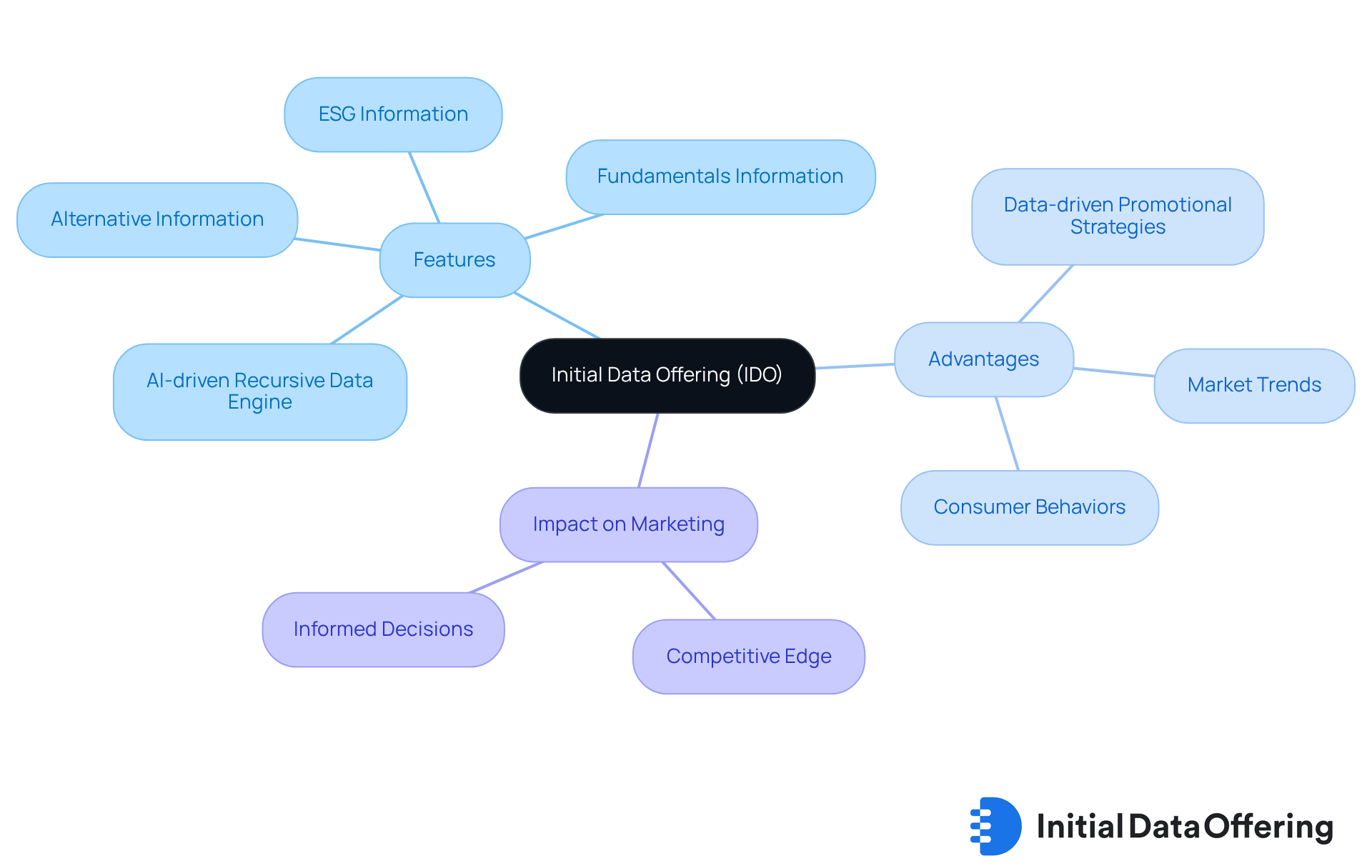
Business Intelligence: Leverage Data for Strategic Marketing Decisions
Business intelligence (BI) is essential in marketing analytics consulting, utilizing analytical tools to gather, process, and examine promotional information. This strategic approach enables marketers to utilize marketing analytics consulting to identify emerging trends, evaluate campaign effectiveness, and make informed decisions based on comprehensive analysis. By aligning promotional strategies with business objectives, organizations can enhance their understanding of market dynamics, ultimately leading to improved outcomes.
The impact of data analysis on the effectiveness of promotional strategies is substantial. Companies leveraging marketing analytics consulting report a marked improvement in their ability to measure and optimize promotional campaigns. Notably, 49% of organizations have increased their use of business intelligence analytics compared to pre-pandemic levels, underscoring the growing dependence on data-driven insights. How can your organization harness this trend to enhance its promotional efforts?
Industry leaders emphasize the necessity of information literacy in promotion. As Piyanka Jain remarked, "Everyone requires information literacy, because information is ubiquitous. It’s the new currency; it's the language of business. We need to be able to speak that." This underscores the importance of equipping promotional teams with the skills to analyze and respond to data effectively.
Moreover, successful marketing campaigns increasingly depend on marketing analytics consulting and information analysis tools. With 61% of organizations utilizing four or more business intelligence platforms, marketers can tap into diverse data sources to refine their strategies and boost customer engagement. This multifaceted approach not only enhances campaign performance but also cultivates a culture of data-driven decision-making within organizations. Additionally, the global business intelligence market is projected to reach $54.27 billion by 2030, highlighting the growing significance and investment in BI tools. How prepared is your organization to adapt to this evolving landscape?
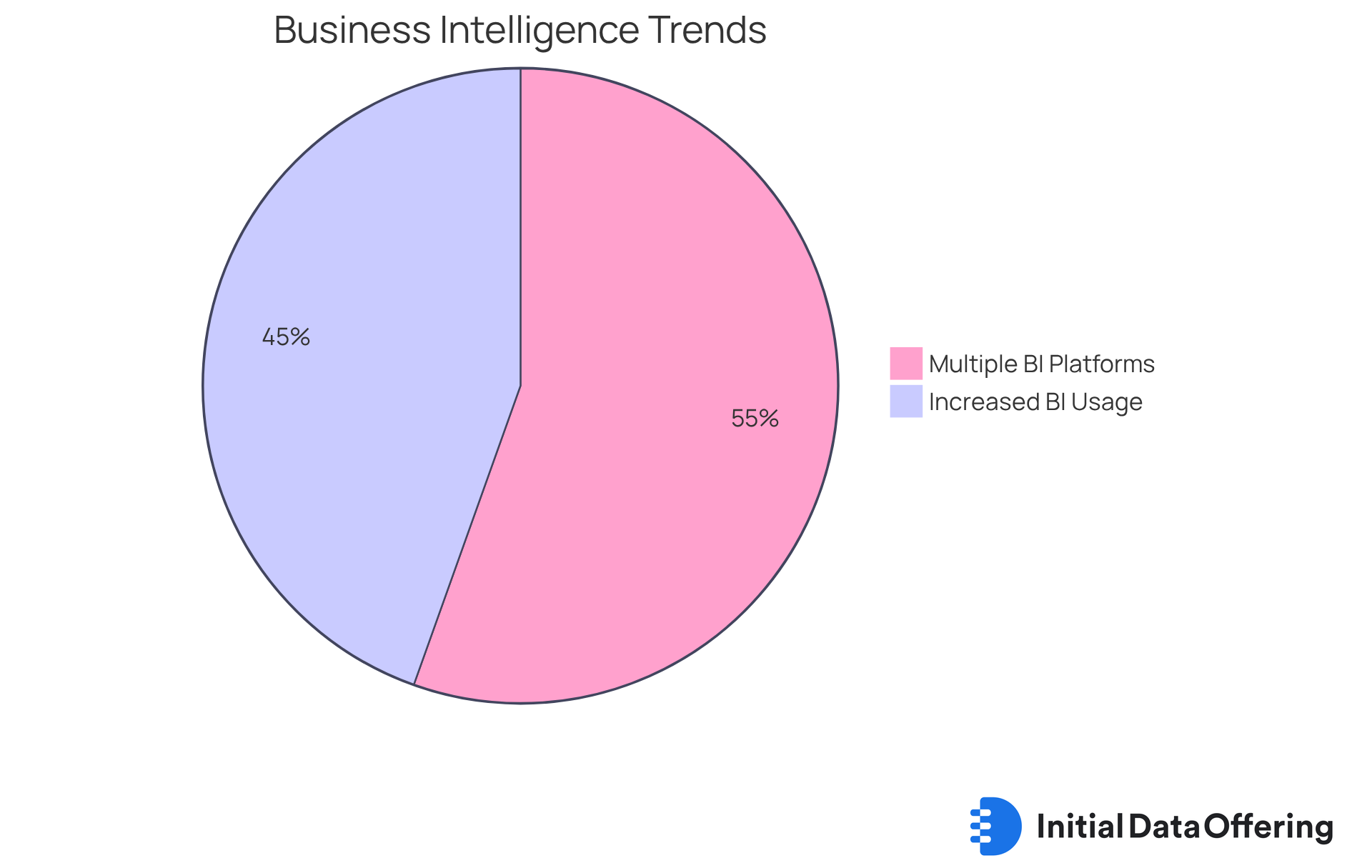
Customer Analytics: Gain Insights into Consumer Behavior and Preferences
Customer analytics plays a crucial role in understanding consumer interactions and behaviors. By utilizing advanced tools that track customer journeys, preferences, and feedback, marketers can gain vital insights into the factors that shape consumer decisions. This understanding is essential for crafting personalized marketing campaigns that not only enhance customer engagement but also build loyalty, ultimately leading to increased sales and brand advocacy.
For example, businesses that harness insights from consumer behavior can effectively tailor their messaging, resulting in campaigns that resonate more deeply with their target audience. These personalized strategies significantly improve customer experiences and drive higher conversion rates. In a competitive landscape, utilizing marketing analytics consulting to grasp consumer behavior through data analysis is not just beneficial; it is vital for sustained growth and success.
Moreover, employing predictive and prescriptive data analysis allows for greater personalization and targeted promotions, enabling companies to anticipate consumer needs. Effective segmentation techniques—demographic, firmographic, behavioral, and psychographic—are crucial for maximizing the impact of these analyses. Did you know that 74% of marketers believe content promotion has helped generate demand and leads? This statistic highlights the importance of marketing analytics consulting for implementing data-driven strategies in today’s market.
Additionally, integrating insights from AI can further refine consumer behavior analysis, providing a modern approach to understanding and engaging with customers. By leveraging these insights, marketers can create more effective strategies that not only meet but exceed consumer expectations.
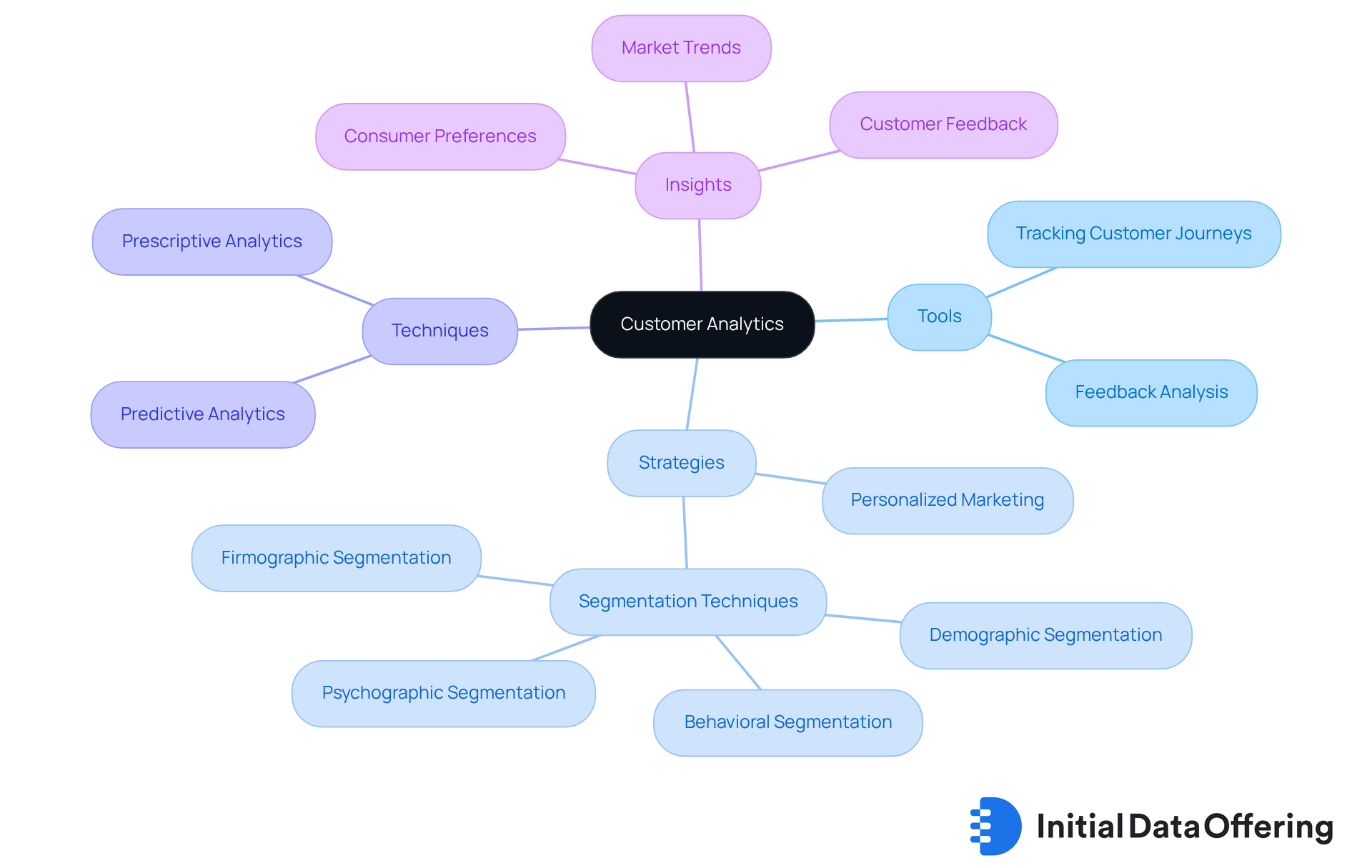
Marketing Analytics: Optimize Campaigns and Measure Effectiveness
Analytics in promotion is part of marketing analytics consulting, which involves the systematic measurement, management, and examination of performance data. This process allows promoters to assess campaign effectiveness in real-time. By leveraging various metrics and key performance indicators (KPIs), marketers can continuously refine their strategies and make informed budget allocations. This proactive approach not only enhances the return on investment (ROI) of promotional initiatives but also supports a culture of data-driven decision-making with marketing analytics consulting.
Real-time data analysis is crucial in this context, enabling marketers to swiftly identify trends and adjust tactics. For example, organizations that implement structured daily routines for campaign check-ups can tackle small issues before they escalate. This transforms optimization from a quarterly task into a daily habit, effectively improving engagement and shortening sales cycles by up to 15 days.
Moreover, case studies illustrate the impact of real-time data analysis on marketing ROI, emphasizing the role of marketing analytics consulting. Companies utilizing automated insights report saving over 400 hours monthly while achieving an impressive 368% ROI. These insights empower marketers to translate campaign metrics into compelling ROI narratives, ensuring their strategies resonate with executives and stakeholders.
As the marketing landscape evolves, it’s essential for marketers to prioritize marketing analytics consulting that integrates advanced analytics tools for real-time performance measurement. By focusing on actionable insights and aligning metrics with business outcomes, organizations can enhance their marketing effectiveness and drive sustainable growth. With 96% of potential clients conducting their own research before engaging with sales representatives, the need for real-time information analysis becomes even more critical. Marketers should heed Benjamin Franklin's advice to avoid busywork in analysis, emphasizing the importance of converting information into meaningful actions. Additionally, adhering to data privacy regulations is vital in today’s promotional landscape, ensuring organizations effectively address challenges while utilizing data analysis.
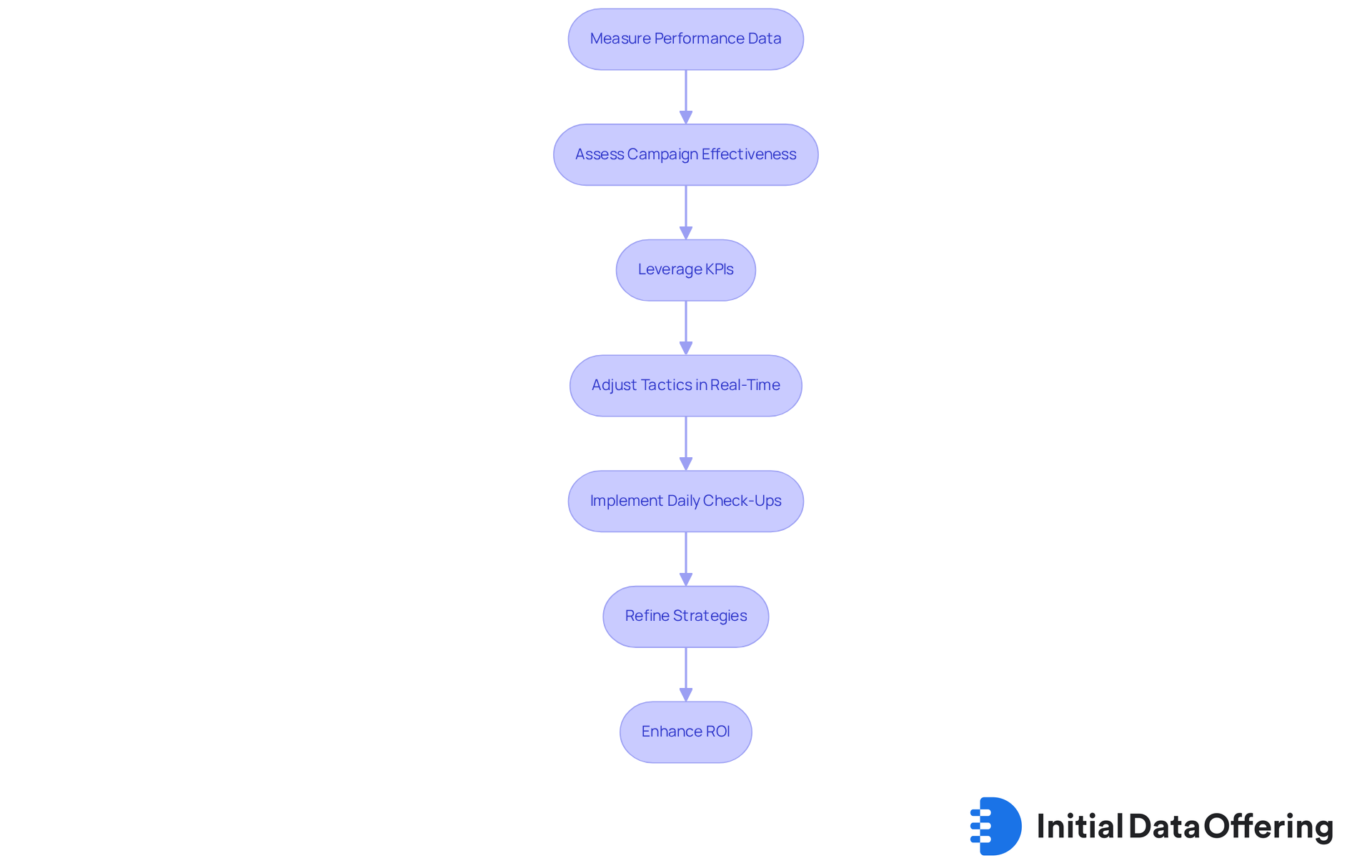
Financial Analytics: Assess Marketing ROI and Budget Efficiency
Financial analytics is crucial for evaluating the financial implications of promotional strategies. By examining key metrics like return on investment (ROI), customer acquisition cost (CAC), and customer lifetime value (LTV), marketers can assess the effectiveness of their campaigns and make informed budgetary decisions. For instance, a well-calibrated ROI calculation can reveal that a promotional campaign generating €90,000 in revenue against €15,000 in costs results in an impressive ROI of 500%. This financial insight is vital for justifying promotional expenditures and ensuring resources are allocated efficiently to maximize profitability.
As we look ahead to 2025, assessing budget efficiency requires a strategic approach that aligns with overall business objectives. Successful budget allocation strategies often depend on rigorous ROI tracking, enabling companies to pinpoint which campaigns yield the best returns. This method not only enhances overall promotional performance but also fosters a culture of data-informed decision-making, thereby reducing risks associated with promotional investments.
Understanding the impact of customer acquisition cost on promotional budget decisions is essential. By analyzing CAC alongside LTV, companies can allocate their budgets more effectively, ensuring investments are made in channels that deliver the greatest returns. For example, a company that successfully lowered its CAC through targeted campaigns experienced a notable increase in customer engagement and retention, ultimately boosting profitability.
Financial analysts emphasize that aligning performance metrics with broader business objectives is critical for effective ROI assessment. This alignment ensures that every euro spent is evaluated for its impact on company growth, highlighting the importance of strategic planning in analytics. Moreover, email promotion boasts an average ROI of 3600%, showcasing the effectiveness of specific channels in budget distribution strategies. Incorporating A/B testing can further refine promotional efforts by identifying the most effective combinations for better returns. As Vincent Chevalier Levy notes, "Marketing ROI is one of the key metrics that do just that," underscoring the significance of these strategies.
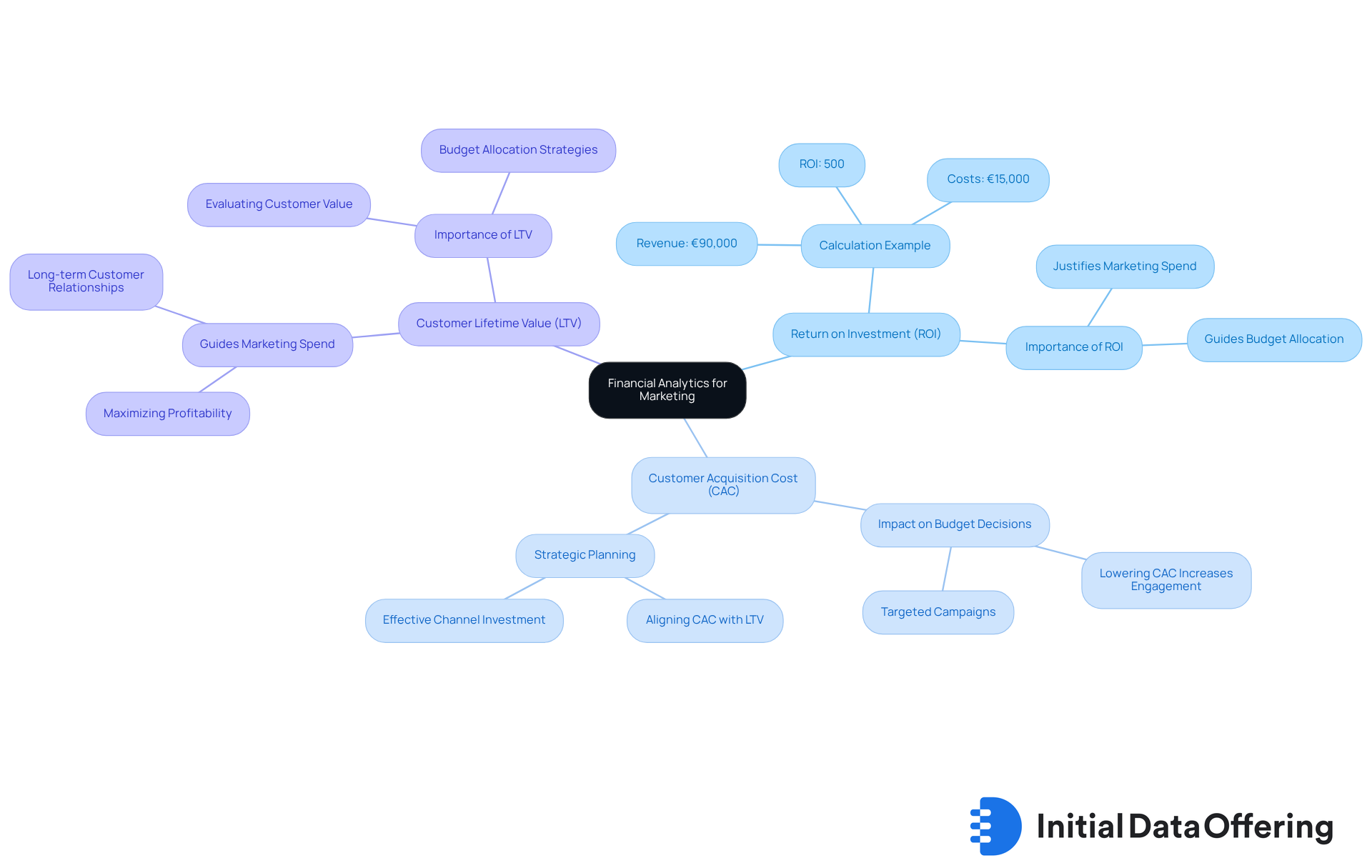
Operations Analytics: Enhance Efficiency in Marketing Processes
Operations analysis is crucial for enhancing processes in marketing analytics consulting. By examining operational information, it helps identify inefficiencies and opportunities for improvement. This data-driven approach allows marketers to streamline workflows, cut costs, and increase campaign effectiveness. For instance, organizations that invest in data analysis capabilities have outperformed the S&P 500 by an average of 64%. This statistic underscores the competitive edge gained through data-driven strategies.
The focus on operational efficiency not only boosts productivity but also equips teams to respond quickly to market changes and evolving consumer demands. By leveraging automation tools and incorporating marketing analytics consulting, companies can anticipate trends and refine their promotional efforts, leading to substantial cost savings. A notable case study demonstrated that using Python scripts for automating complex information processing tasks reduced time by 48 hours monthly while simultaneously increasing leads by 13 times.
Industry leaders emphasize the importance of marketing analytics consulting in refining promotional processes. Julio Hernandez, a former partner at Accenture, remarked, "Companies need to be analytically inclined and data-driven to turn insights into action for driving growth." As organizations prioritize data accessibility and analytical insights, they cultivate a culture of transparency and collaboration. This environment empowers teams to make informed decisions that propel growth. By harnessing operational insights, companies can enhance their marketing effectiveness with marketing analytics consulting and position themselves for long-term success in a competitive landscape.
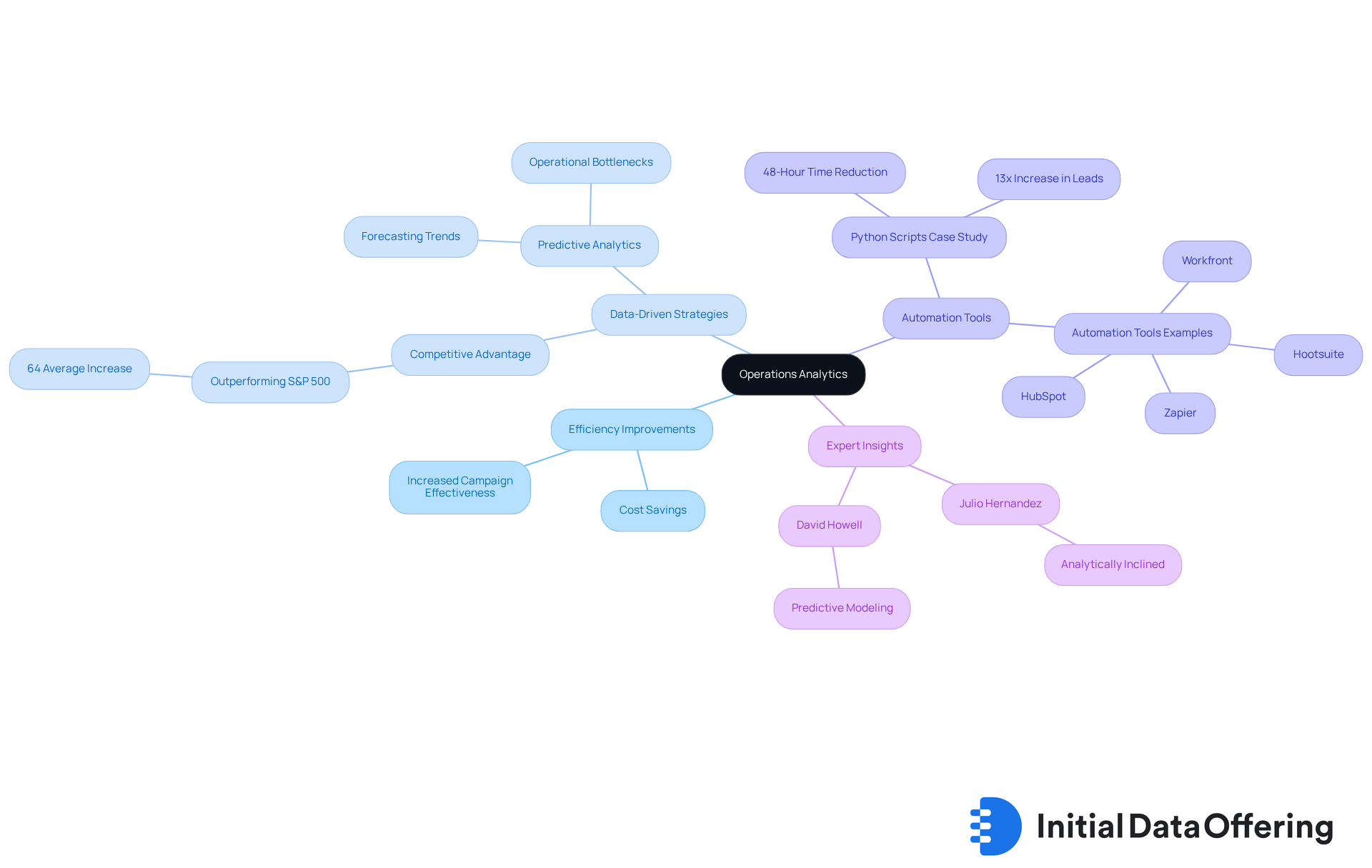
Analytics Consulting Process: Steps to Deliver Effective Marketing Solutions
The data consulting process is a systematic approach that encompasses several essential steps:
- Defining project objectives
- Gathering and analyzing information
- Developing insights
- Implementing solutions
This structured methodology ensures that consultants' recommendations align with client goals, leading to actionable and effective solutions. By clearly defining project objectives, consultants can tailor their approaches to meet specific client needs, significantly enhancing client satisfaction.
Organizations that employ structured data consulting report a threefold increase in decision-making effectiveness compared to those relying solely on intuition. According to Gartner, "Organizations executing a clear information strategy are 1.7 times more likely to excel compared to their peers." This highlights the importance of a well-defined strategy in achieving superior outcomes.
Moreover, the application of these insights yields quantifiable results. Companies utilizing data analysis have seen revenue increases ranging from 5% to 25%, depending on their industry and execution. For instance, SR Analytics focuses on transforming raw data into actionable insights, facilitating faster decisions and measurable impacts. This comprehensive approach not only drives better outcomes but also fosters a collaborative environment where clients feel empowered to make data-driven decisions.
How can your organization leverage structured data consulting to enhance decision-making? By adopting these practices, you can position your team to achieve significant improvements in effectiveness and satisfaction.
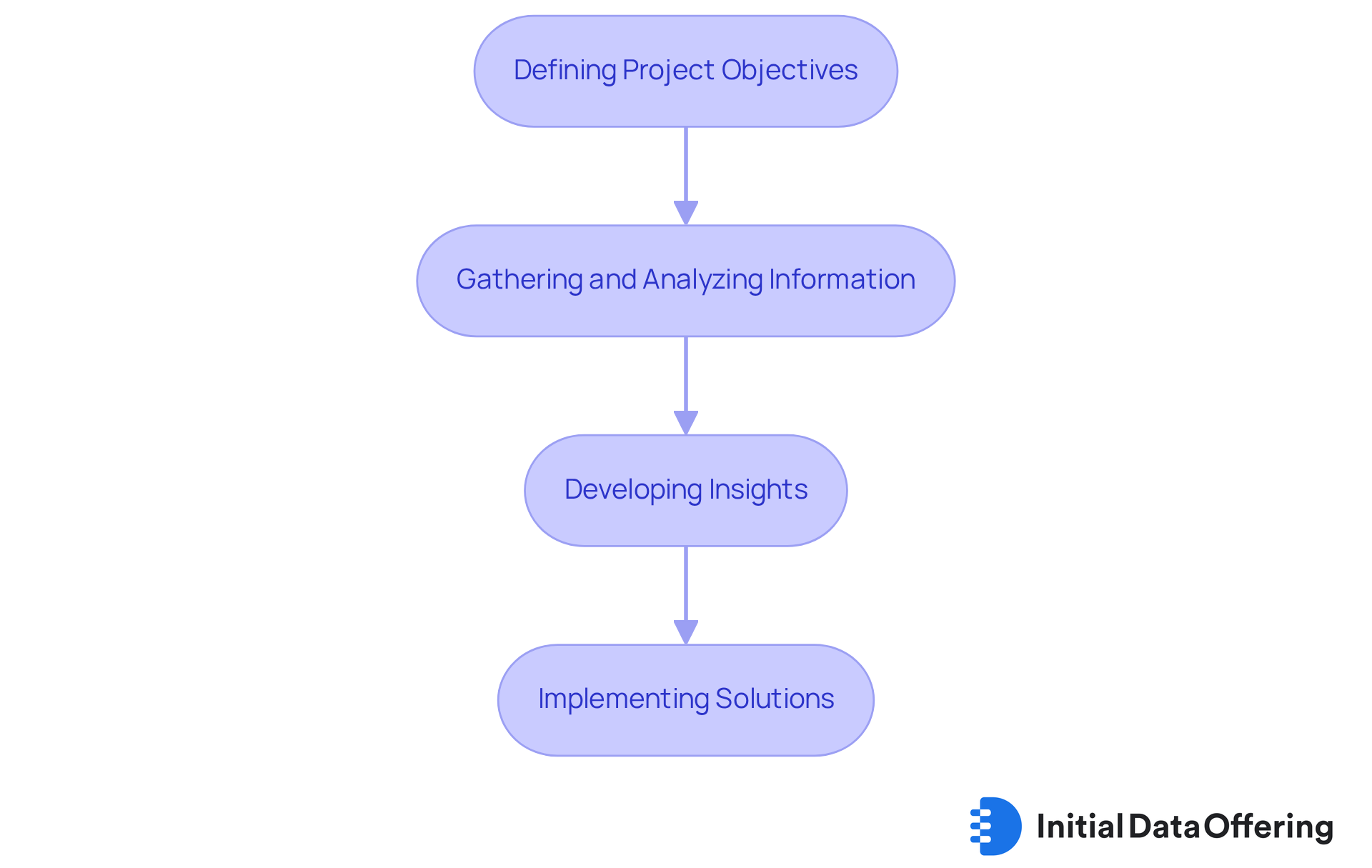
Benefits of Analytics Consulting: Drive Better Marketing Outcomes
Marketing analytics consulting offers significant advantages that can transform the way organizations operate. By improving decision-making, enhancing campaign performance, and aligning with overarching business goals, marketing analytics consulting becomes a vital tool for success.
One of the standout features of analytics consulting is its ability to uncover concealed opportunities through expert knowledge and sophisticated analytical methods. For instance, companies that utilize predictive data analysis are 5.2 times more likely to achieve high performance. This statistic underscores the advantage of adopting data-driven methods in promotional strategies. Moreover, organizations investing in marketing analytics consulting often see a remarkable 127% return on investment within three years, showcasing the tangible benefits of this approach in contemporary marketing efforts.
Additionally, firms with a clearly articulated information plan are 1.7 times more likely to excel compared to their counterparts. This highlights the importance of strategic alignment in achieving business objectives. As promotion experts increasingly recognize the value of data, it's noteworthy that 79% of top marketers believe promotional analysis will be essential for future success.
How can your organization leverage these insights? Incorporating data analysis into your promotional strategies not only leads to improved results but also fosters sustainable development. By embracing marketing analytics consulting, businesses can position themselves for long-term success in an ever-evolving marketplace.
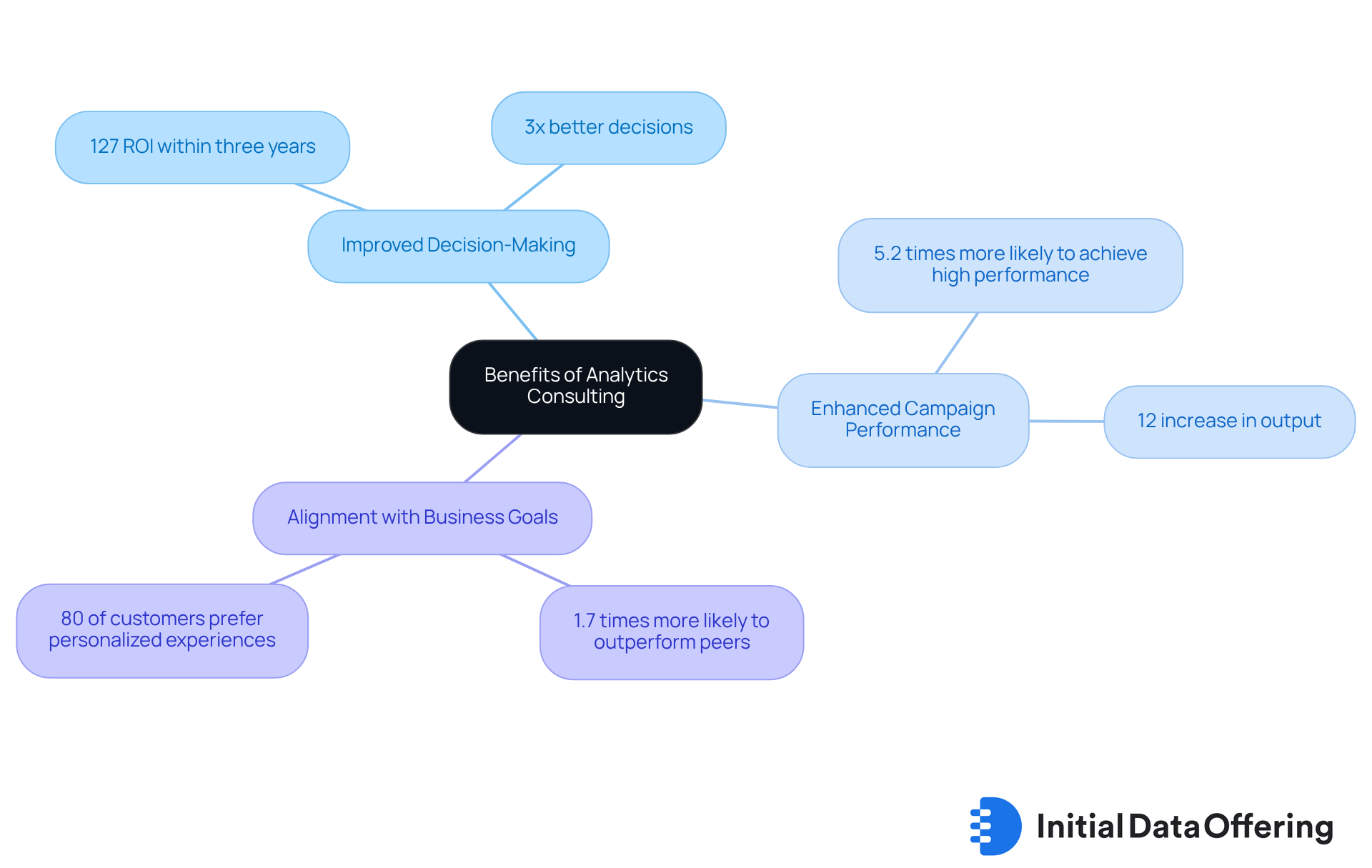
Education and Training: Pathways to a Career in Marketing Analytics Consulting
To pursue a career in consulting for data analysis, individuals should consider obtaining a degree in business, data science, or a related area. Certifications in data analysis, analytics for promotion, or business intelligence can significantly enhance job opportunities. Continuous learning through workshops, online courses, and industry conferences is essential for staying updated on the latest trends and tools in the field.
Notably, 90% of graduates in advertising believe a strong digital portfolio significantly enhances their employability. This statistic highlights the importance of practical experience alongside certifications. Furthermore, 35% of employers in the field are more likely to hire graduates with additional certifications in tools like Google Ads and SEO. This underscores the value of these credentials in making candidates more attractive to potential employers.
Many certifications in data analysis do not require previous experience or specific educational qualifications, making them accessible to a wider audience. As Brian Tracy aptly puts it, 'Commit yourself to lifelong learning. The most valuable asset you'll ever have is your mind and what you put into it.' This commitment to ongoing education not only sharpens analytical skills but also positions individuals favorably in a competitive job market.
In fact, over 60% of job openings in the field require proficiency in digital tools and methods. This statistic makes it clear that certifications are a crucial aspect of career advancement in this dynamic area. How can you leverage these insights to enhance your own career prospects? Consider investing in your education and certifications to stay ahead in the ever-evolving landscape of data analysis.
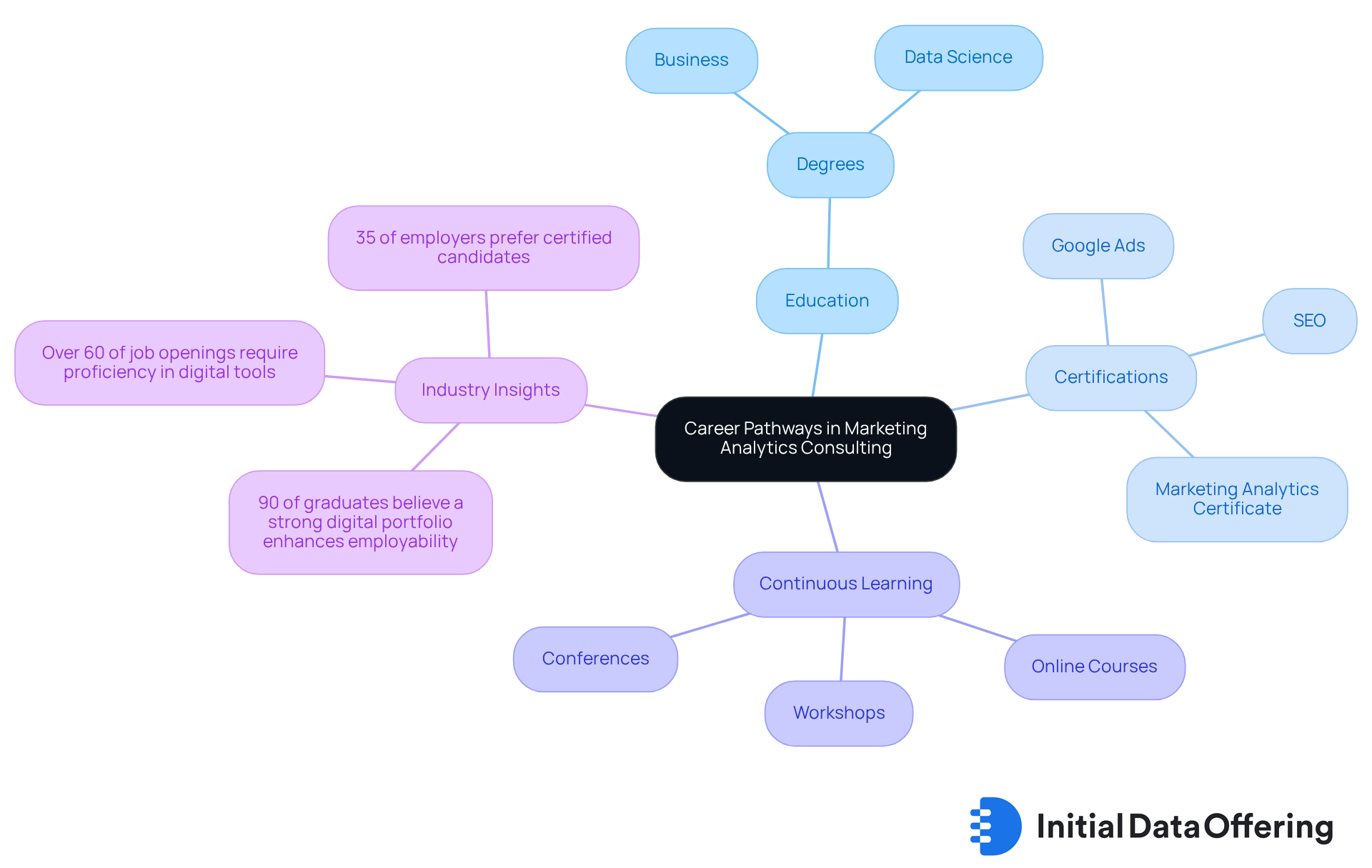
Who Uses Analytics Consulting: Understanding the Target Audience
Analytics consulting services play a vital role across various industries, including retail, finance, healthcare, and technology. These services cater to businesses of all sizes, from startups to large enterprises, aiming to enhance marketing strategies with marketing analytics consulting, improve customer engagement, and drive growth.
One notable feature of analytics consulting is the use of advanced tools like Media Radar, which employs Natural Language Processing (NLP) for real-time media monitoring and sentiment analysis. This capability provides consultants with actionable insights that are crucial for navigating the complexities of market dynamics. By understanding the specific needs and challenges of their target audiences, consultants can deliver tailored solutions that address unique requirements.
The advantages of leveraging analytics consulting are significant. For instance, utilizing instant workforce insights and job change data can inform strategic decisions, allowing businesses to adapt swiftly to changing market conditions. How can your organization benefit from these insights?
In conclusion, marketing analytics consulting services not only enhance decision-making but also empower businesses to thrive in competitive landscapes. By embracing these services, companies can unlock new growth opportunities and foster stronger customer relationships.
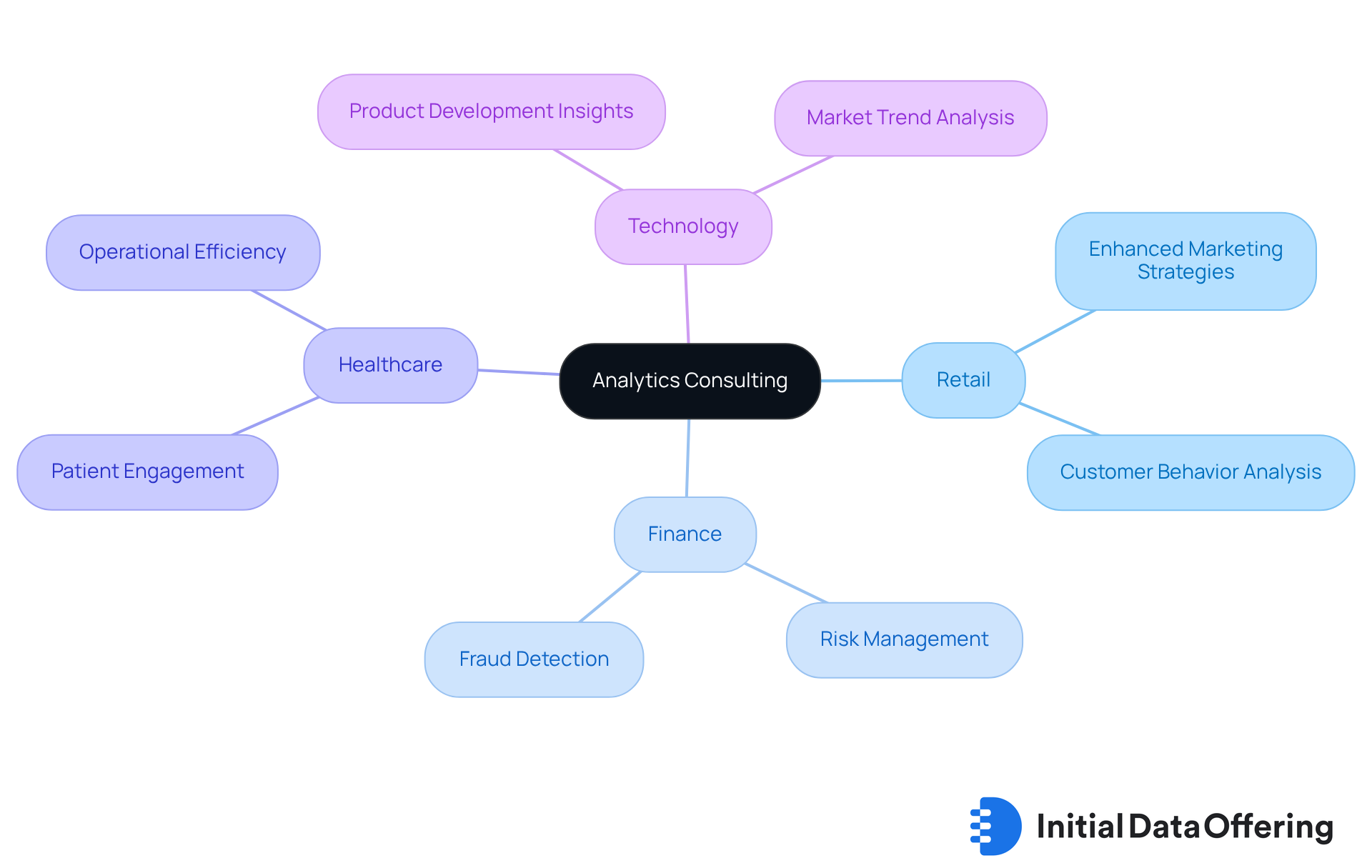
Conclusion
Marketing analytics consulting stands as a cornerstone for businesses aiming to excel in a data-driven landscape. What if you could leverage comprehensive data insights to craft strategies that truly resonate with your consumers? By doing so, organizations can optimize their marketing campaigns and drive significant growth. The integration of advanced analytics tools not only enhances decision-making but also ensures that marketing efforts align seamlessly with broader business objectives.
Key strategies include:
- Utilizing high-quality datasets
- Implementing business intelligence tools
- Harnessing customer analytics
These features provide marketers with essential insights to navigate complex market dynamics effectively. The emphasis on real-time data analysis and financial metrics highlights the importance of a structured approach in evaluating marketing performance and ROI. As organizations adopt these practices, they position themselves to uncover hidden opportunities and foster a culture of data-driven decision-making.
In a world where consumer expectations are constantly evolving, embracing marketing analytics consulting is not just advantageous; it’s essential for sustained success. Companies should invest in education and training to equip their teams with the skills necessary to harness the power of analytics. How can your organization unlock new growth avenues and enhance its competitive edge? By doing so, they can ensure responsiveness to the ever-changing marketing landscape, ultimately securing their place at the forefront of their industry.
Frequently Asked Questions
What is the Initial Data Offering (IDO)?
The IDO is a centralized platform that provides marketers access to a diverse range of high-quality datasets specifically designed for marketing analytics consulting.
What features make IDO unique?
IDO leverages SavvyIQ's AI-driven Recursive Data Engine to offer collections that include alternative information, fundamentals information, and ESG information, enabling marketers to gain unique insights for better decision-making.
How does IDO benefit marketers?
By accessing specialized datasets through IDO, marketers can craft data-driven promotional strategies that align with current market trends and consumer behaviors, essential for driving business growth.
What role does business intelligence (BI) play in marketing analytics consulting?
BI utilizes analytical tools to gather, process, and examine promotional information, helping marketers identify trends, evaluate campaign effectiveness, and make informed decisions that align with business objectives.
How has the use of business intelligence analytics changed recently?
49% of organizations have increased their use of business intelligence analytics compared to pre-pandemic levels, indicating a growing reliance on data-driven insights.
Why is information literacy important in marketing?
Information literacy is crucial because it enables promotional teams to analyze and respond to data effectively, which is essential for crafting successful marketing strategies.
How many organizations use multiple business intelligence platforms?
61% of organizations utilize four or more business intelligence platforms to refine their strategies and enhance customer engagement.
What is the projected growth of the global business intelligence market?
The global business intelligence market is projected to reach $54.27 billion by 2030, highlighting the increasing significance of BI tools.
What is the importance of customer analytics in marketing?
Customer analytics helps marketers understand consumer interactions and behaviors, which is vital for creating personalized marketing campaigns that enhance engagement and drive loyalty.
How can predictive and prescriptive data analysis benefit marketing strategies?
These analyses allow for greater personalization and targeted promotions, enabling companies to anticipate consumer needs and tailor their messaging effectively.
What percentage of marketers believe content promotion generates demand and leads?
74% of marketers believe that content promotion has helped generate demand and leads, underscoring the importance of data-driven strategies in marketing.
How can AI enhance consumer behavior analysis?
Integrating insights from AI can refine consumer behavior analysis, providing a modern approach to understanding and engaging with customers, leading to more effective marketing strategies.